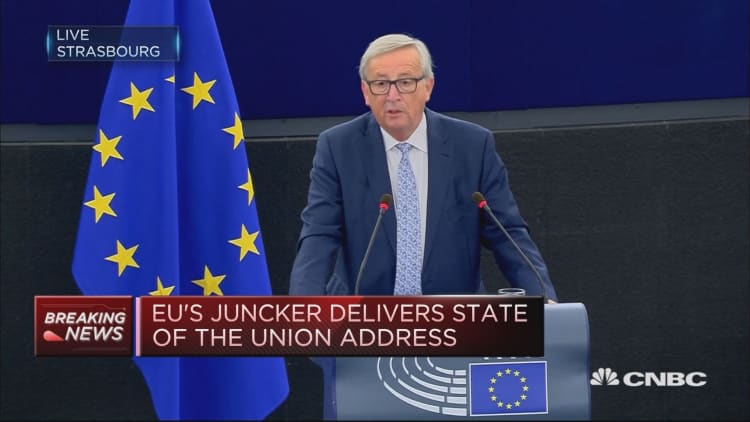In a key six-thousand-word speech, the European Union mentioned the United Kingdom once and avoided the word Brexit.
The strategy of the European Commission – Europe's leading Brexit negotiator – has been clear since the U.K. voted to leave the bloc: building a team that only deals with Brexit, redirecting all Brexit-related issues to it, and talking about all the other policies that it's trying to push forward.
Proof of this came on Wednesday in a speech delivered by the European Commission President Jean-Claude Juncker, where he dubbed Brexit as "a sad and tragic moment." But the EU cannot draft its future without thinking about Brexit.
"On 29 March 2019, the United Kingdom will leave the European Union. This will be a very sad and tragic moment. We will always regret it. But we have to respect the will of the British people," Juncker told the European Parliament in Strasbourg.
"On 30 March 2019, we will be a Union of 27. I suggest that we prepare for this moment well, amongst the 27 and within the EU institutions," he said.
For an hour, Juncker asked the 27 European countries to integrate further on all fronts before the U.K. leaves in 2019. This includes having the same rules for banks across the euro zone, all countries agreed to put an end to border controls, and where standards for products in the single market are fair across the region.

Juncker's somewhat federalist vision cannot, however, become reality without considering the impact of Brexit.
"European Parliament elections will take place just a few weeks later, in May 2019. Europeans have a date with democracy. They need to go to the polls with a clear understanding of how the European Union will develop over the years to come," Juncker noted during his speech.
The last European Parliament elections showed a divided Europe that gave Eurosceptic parties momentum and space in politics. Whether or not Europe will manage to reverse the trend will be influenced by how the U.K. agrees to leave in March 2019 – two months before Europeans go to the polls.
Karel Lannoo, chief executive officer at the Brussels-based Centre for European Policy Studies think tank, told CNBC via email Wednesday: "This is the official line, not to speak too much about (Brexit), as if it is a side event. But it is not; it affects the EU fundamentally and it will require Treaty change."

The Brexit vote has been a wakeup call for EU policymakers. Most have stated that it's important to move forward with the economic and political union to ensure that the project that has guaranteed peace will not collapse.
The election of President Emmanuel Macron in France has boosted that momentum with his reformist agenda for Europe. The upcoming election in Germany should also be positive for further European reform. But this can only work if it goes hand in hand with the Brexit process. Otherwise, voters might focus on the advantages of leaving the bloc rather than on the disadvantages when they face the ballot box.
Carsten Brzeski, chief economist at ING in Germany, told CNBC via email that he wasn't surprised with Juncker's speech.
"Juncker's stance was a clear signal that life goes on and that Brexit should mainly be a concern for the UK but not the EU," he said.
"He also tried to create a sense for urgency, despite the current cyclical tailwind. Not an easy one, given that Europe does not have a good track record in pushing more reforms in good times. Normally, it always takes bad times for the EU to move on," he noted.


